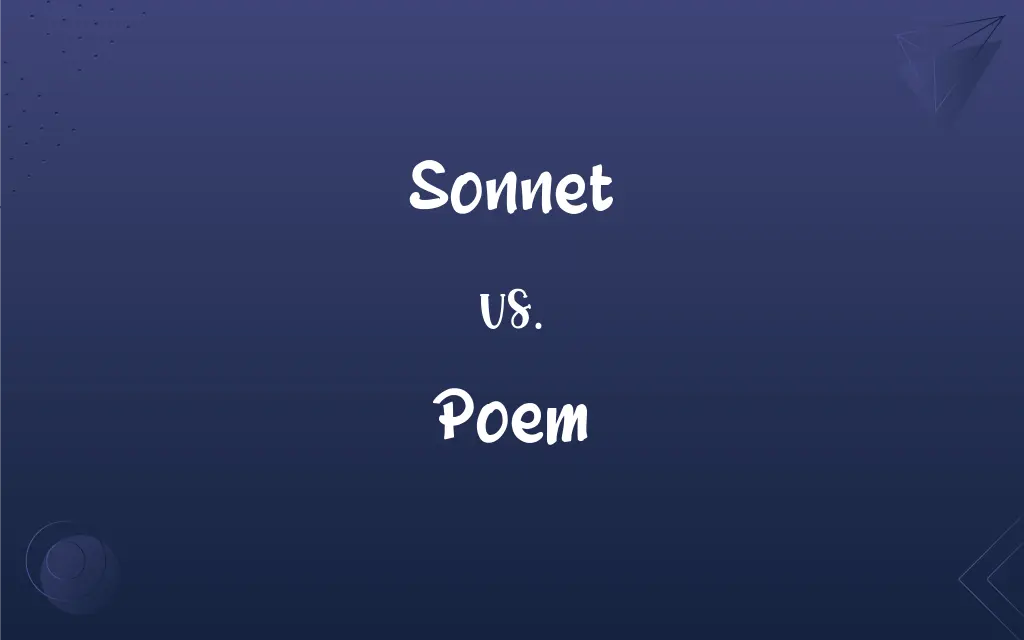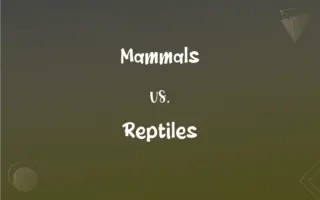Sonnet vs. Poem: What's the Difference?
Edited by Janet White || By Harlon Moss || Updated on October 25, 2023
A sonnet is a 14-line poem with a specific structure and rhyme scheme, while a poem is a broad term for a piece of writing that expresses emotions or ideas.

Key Differences
A sonnet is a specific type of poem that consists of 14 lines. A poem, on the other hand, is a general term used to describe any composition designed to convey experiences, ideas, or emotions in a rhythmic and/or metaphorical manner.
Sonnets have a particular structure, often adhering to either the Shakespearean or Petrarchan formats. Poems, meanwhile, can take on countless forms and structures, ranging from free verse to haikus to epics.
The sonnet as a poetic form has rules, such as a certain rhyme scheme and meter, commonly iambic pentameter. The poem, as a broader term, can encompass a multitude of rhyme schemes, meters, and patterns or have none at all.
While sonnets often deal with themes of love, beauty, or time, a poem can be about any topic, capturing a vast array of subjects, themes, and emotions.
In essence, all sonnets are poems, but not all poems are sonnets. The scope of what a poem can be is much broader than the defined constraints of a sonnet.
ADVERTISEMENT
Comparison Chart
Length
Always 14 lines
Varies (from one line to many pages)
Structure
Specific structures (e.g., Shakespearean)
Can have many structures or none at all
Rhyme Scheme
Predetermined (e.g., ABABCDCDEFEFGG)
Varies, or may be absent
Meter
Typically iambic pentameter
Can vary or be non-existent
Themes
Often love, beauty, time
Virtually any topic, theme, or emotion
ADVERTISEMENT
Sonnet and Poem Definitions
Sonnet
Sonnets traditionally explore themes of love, beauty, and the passage of time.
The sonnet beautifully captured the ephemeral nature of beauty and youth.
Poem
A poem is a composition that expresses emotions or ideas in rhythmic and metaphorical language.
Emily Dickinson's Because I could not stop for Death is a thought-provoking poem.
Sonnet
A sonnet employs iambic pentameter as its typical meter.
Reading the sonnet aloud, the rhythm of the iambic pentameter was evident.
Poem
A poem can be of any length, from a short haiku to an epic like "The Iliad."
The epic poem spanned hundreds of pages, detailing heroic deeds.
Sonnet
A sonnet is a 14-line lyrical poem with a strict form.
Shakespeare's Shall I compare thee to a summer's day? is a famous sonnet.
Poem
Poetry is a form of literature that captures the essence of human emotion and experience.
The poem, with its vivid imagery and profound themes, deeply resonated with readers.
Sonnet
A sonnet adheres to specific rhyme schemes, often Shakespearean or Petrarchan.
His sonnet followed a Petrarchan rhyme scheme, distinct from Shakespearean style.
Poem
Poems often employ devices like rhyme, meter, and alliteration to enhance their impact.
The poem's consistent use of alliteration added a melodic quality to its verses.
Sonnet
The sonnet as a form originated in Italy, popularized by poets like Petrarch.
The Renaissance saw the sonnet flourish, with poets adapting the Italian form.
Poem
Poems use structured or free verse to convey meaning and emotion.
The poem's free verse allowed the author's raw emotions to pour forth unhindered.
Sonnet
A 14-line verse form often in iambic pentameter, having one of several conventional rhyme schemes and usually featuring a shift in mood or tone after the eighth or twelfth line.
Poem
A verbal composition designed to convey experiences, ideas, or emotions in a vivid and imaginative way, characterized by the use of language chosen for its sound and suggestive power and by the use of literary techniques such as meter, metaphor, and rhyme.
FAQs
Can a poem be just one line?
Yes, a poem can be a single line, known as a monostich.
What is a sonnet?
A sonnet is a 14-line lyrical poem with a specific structure and rhyme scheme.
Are all sonnets poems?
Yes, all sonnets are poems, but not all poems are sonnets.
Can a poem tell a story?
Yes, narrative poems specifically tell a story, often with characters and a plot.
How is the structure of a sonnet important?
The structure gives sonnets their unique rhythm and flow, enhancing their impact.
Can poems be without rhyme?
Yes, many poems, especially in free verse, don't use rhyme.
What themes are commonly found in sonnets?
Sonnets often explore themes of love, beauty, and the passage of time.
Why do sonnets have 14 lines?
It's a convention of the form, rooted in its historical development and tradition.
What's the main purpose of a poem?
The main purpose of a poem is to convey emotions, ideas, or experiences through rhythmic and often metaphorical language.
Can sonnets be about topics other than love?
Yes, while love is common, sonnets can cover a range of topics.
What is the primary difference between a sonnet and a poem?
A sonnet is a specific type of poem with defined characteristics, while "poem" is a broad term encompassing various forms of poetic expression.
Are there different types of sonnets?
Yes, the two main types are Shakespearean and Petrarchan, each with its own rhyme scheme.
How has the definition of "poem" evolved?
While the essence remains consistent, the forms, styles, and themes of poems have diversified over time.
Are poems and sonnets only meant for reading?
No, they can be recited, sung, or even performed; they are versatile forms of expression.
Are there modern sonnets?
Yes, contemporary poets still write sonnets, often with innovative twists.
Can one write a sonnet without adhering to iambic pentameter?
Traditionally, sonnets use iambic pentameter, but modern sonnets sometimes deviate from this.
Can poems have rules like sonnets?
Yes, certain types of poems have specific rules, but not all poems are bound by them.
What is free verse in poetry?
Free verse is poetry that doesn't follow regular rhyme or meter but is rhythmical.
Do all poems need to have a deep meaning?
No, poems can be light-hearted, humorous, or even nonsensical; it's up to the poet's intent.
What's the origin of the sonnet?
The sonnet originated in Italy, popularized by poets like Petrarch.
About Author
Written by
Harlon MossHarlon is a seasoned quality moderator and accomplished content writer for Difference Wiki. An alumnus of the prestigious University of California, he earned his degree in Computer Science. Leveraging his academic background, Harlon brings a meticulous and informed perspective to his work, ensuring content accuracy and excellence.
Edited by
Janet WhiteJanet White has been an esteemed writer and blogger for Difference Wiki. Holding a Master's degree in Science and Medical Journalism from the prestigious Boston University, she has consistently demonstrated her expertise and passion for her field. When she's not immersed in her work, Janet relishes her time exercising, delving into a good book, and cherishing moments with friends and family.































































